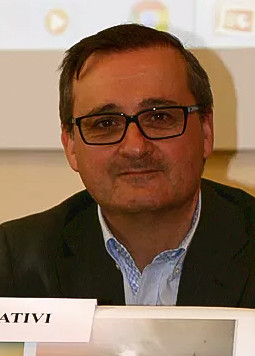Blog / Stefano Nativi / December 18, 2019


Last September, about 400 delegates gathered in Florence, Italy from all over the world, to attend the 11th International Symposium on Digital Earth (ISDE11).
The Opening Plenary session was held in the historic Salone dei Cinquecento at Palazzo Vecchio. This included a celebration ceremony for the 20th anniversary of the International Symposium on Digital Earth which was initiated in Beijing, China in November 1999 by the Chinese Academy of Sciences (CAS).
The event endorsed and approved a new Declaration by the International Society for the Digital Earth, The 2019 ISDE Florence Declaration. After 10 years in the making, this declaration lays the path to a new definition of Digital Earth that will be finalized in the first months of 2020.
The event presented a future vision of Digital Earth in a Transformed Society. About 30 sessions illustrated the various challenges and opportunities in building a Digital Earth. They included five Grand Debates and Plenary sessions dealing with issues related to: “Trust and Ethics in Digital Earth”; “Digital Earth for United Nations Sustainable Development Goals (SDGs)”; “ISDE in a Transformed Society”; “Challenges and Opportunities of Digital Transformation”; and “New Knowledge Ecosystems.”
The ISDE elected a new President, Dr. Alessandro Annoni from the Joint Research Centre of the European Commission. While the former President, Prof. Huadong Guo from the Institute of Remote Sensing and Digital Earth of the CAS, was awarded as Honorary President and ISDE fellow.
Important outcomes arising from the debates and discussions included:
The realization that the digital transformation of our society offers many opportunities but also new challenges for democracy. For example, personalized targeted information can create information bubbles, so it is crucial to (re)create reflective spaces for deliberation and dialogue, and a greater ability to listen to others’ opinions.
The current transformed society requires “trust.” Data and algorithms are increasingly available, but the need for validation is important. Providing open access to codes, scripts and data is necessary for trusted and reproducible knowledge-building.
Artificial Intelligence (AI) and learning-driven AI is the “new” microscope to see hidden data patterns. These new technologies can be used to generate information from Big Data, but AI bias must be carefully considered and managed.
Commercial platform services are increasingly becoming an important asset for research. However, administrative obstacles can be a barrier.
Digital Twins (and by extension Digital Earth) can support environmental sustainability. However, we need to develop applications together with the user community. Digital-physical interaction paradigm is an essential paradigm for Digital Earth.
The combination of Citizen Science and AI adds a complementary and important perspective to Digital Earth research, and addresses part of the larger challenges related to citizen engagement, and trust building that were identified during the meeting.
As a follow-up of ISDE Symposium, two special issues will be published in the T&F International Journal of Digital Earth and MDPI Data journal.
More about the International Society for the Digital Earth:
The International Society for Digital Earth is a non-political, non-governmental and not-for-profit international organization, principally for promoting academic exchange, science and technology innovation, education, and international collaboration towards the creation of a Digital Earth. Digital Earth - the virtual representation of our planet - is a multidisciplinary and collaborative effort that engages different sciences (e.g. Earth, space, information, and human sciences) to monitor and forecast natural and human phenomena. Since the concept of Digital Earth was presented in 1998, the state of Digital Earth science and technology has thrived and provided prosperous growth in key areas. Digital Earth has been at the cutting edge of developments in Earth science, information science, and space science and technology.


References
[1] "The Digital Earth - Al Gore" (http://www.digitalearth-isde.org/userfiles/The_Digital_Earth_Understanding_our_planet_in_the_21st_Century.doc). digitalearth-isde.org. 1998-01-31. Retrieved 2019-12-17.
[2] Foresman, T. W. (2008). "Evolution and implementation of the Digital Earth vision, technology and society" (https://dx.doi.org/10.1080/17538940701782502). International Journal of Digital Earth.
About the author

Stefano Nativi is the Big Data Lead Scientist of the Joint Research Centre of the European Commission. His present research activity deals with the Digital Transformation of our Society and AI. For more than 10 years, he has served as Head of Unit for the National Research Council of Italy, coordinating research programs (funded by EC, US NSF, and National R&I frameworks) on Data Science and Digital Technology applications to trans and multidisciplinary areas. He was co-chair of the Scientific and Technology Committee of the Group on Earth Observation and he funded and chaired the Earth and Space Sciences Informatics division of the European Geosciences Union. He is member of the Council of the International Society for Digital Earth. He was professor at the University of Padua (IT), University of Florence (IT) and Friedrich Schiller University in Jena (DE). He was PDRA at the University of Bristol (UK) and Scholar at the University Corporation for Atmospheric Research in Colorado (USA). He received the EGU Ian McHarg medal in 2019, the Geospatial Innovation Award for "Technology Innovation in Interoperability" by the Geospatial World Forum in 2014, and the Meritorious Service Medal by the IEEE Committee on Earth Observation (ICEO) in 2009. For OGC, he is co-chair of the Earth System Sciences Domain Working Group of OGC and of the netCDF Standardization Working Group.
Thank you for your subscription to the GEO Week 2019 mailing list.